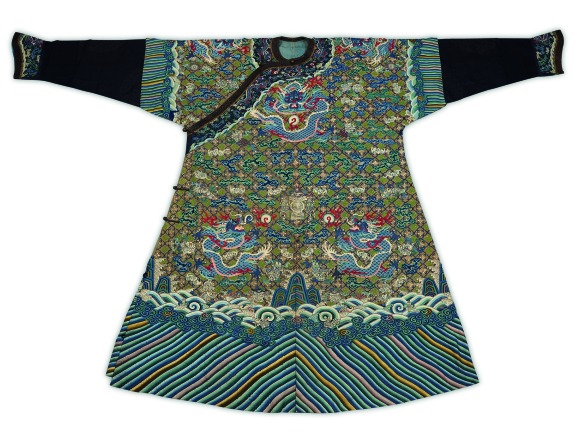Two Hundred Year Old Imperial Chinese Robe Makes £15,000
Experts at Lyon & Turnbull were stunned when they came across a 200 year old Chinese Imperial Robe in a wardrobe in a house in the Highlands of Scotland. The Imperial Kesi Ground Formal Robe, valued at £2,500, sold in their sale of Fine Asian Works of Art on the 11th December for £15,000; it dates from the Qing Dynasty of the 19th century.
The owner form the Highlands of Scotland said “We are delighted with the outcome of the sale and were watching the auction on line; we couldn’t believe that it went so far over the estimate, especially as I was just about to send it off to the charity shop. With Christmas coming I am sure that I will be able to spend it on presents for the family.”
Lee Young Asian Specialist at Lyon & Turnbull and presenter on TV’s Antiques Roadshow said “This is a great result and exactly what makes my job so exciting; you just never know what you might find. I was on a general valuation at a house in the Highlands when I found the robe. “
The robe depicts a gold dragon; court robes included the dragon motif together with a decorative representation of the Chinese conception of the cosmos. The dragon symbolised the emperor, known as the Son of Heaven, and permission to wear the robe was given by him. Those who passed the civil service examinations and attained the status of a government official were also granted the privilege of wearing court robes. Rank was further distinguished by a hierarchy of colour and ornamentation.
It is unclear how the robe came into the family’s possession, but Scotland has a history of travel to the Far East including Scottish seafarers, soldiers, colonial administrators and merchant bankers. Many large international corporations with headquarters in the Far East were set up by entrepreneurial Scots.
Banks like Jardine, Matheson & Co founded in Canton in 1832 by Scots William Jardine and James Matheson created extensive and early Asian connections for the Jardines of Dumfriesshire and other Scottish dynasties.
The boom in the Chinese market has been driven by its surging economy and the new wealthy, urged by the Beijing government to do their “patriotic duty” and bring Chinese artefacts home.
